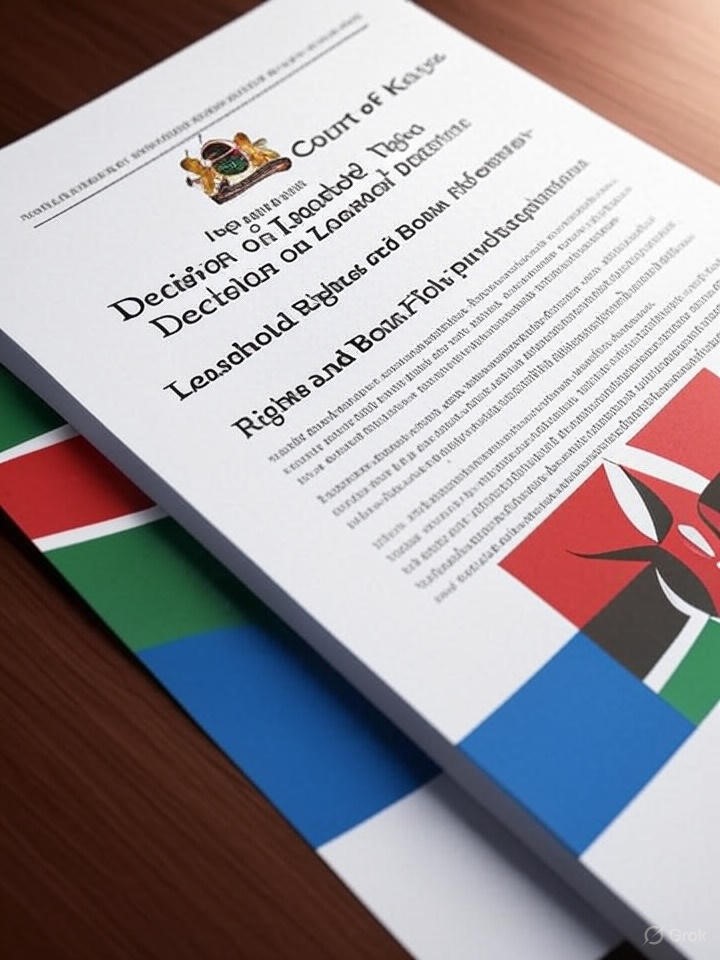On 11th April 2025, the Supreme Court of Kenya delivered a pivotal judgment in Sehmi & another v. Tarabana Company Limited & 5 others (Petition E033 of 2023) [2025] KESC 21 (KLR), addressing critical issues surrounding leasehold property rights, the doctrine of bona fide purchaser for value, and legitimate expectations in lease extensions. This decision has significant implications for leaseholders, property developers, and land registries in Kenya, clarifying the legal framework governing expired leases and subsequent land transactions.
Background
The case involved a dispute over a leasehold property in Ngara, Nairobi (L.R. No. 209/2759/9), originally granted in 1942 and registered to the appellants as tenants in common in 1968. The lease expired in October 2001. The appellants claimed to have applied for an extension on 13th July 2001, before the lease expired, but were forcibly evicted in 2014 by third parties holding a new title issued to the 1st Respondent, Tarabana Company Limited. The appellants argued that their timely application created a legitimate expectation of lease extension and that the subsequent allocation to the 1st Respondent was unlawful. The 1st Respondent, however, claimed to be a bona fide purchaser for value, asserting that its title was indefeasible under the Land Registration Act.
The High Court and the Court of Appeal had previously upheld the 1st Respondent’s title, citing its status as an innocent purchaser. The Supreme Court, however, reversed these decisions, focusing on the legal effects of lease expiry, the doctrine of legitimate expectation, and the limits of indefeasibility of title under Article 40(6) of the Constitution.
The Decision
The Supreme Court made several key findings:
- Lease Expiry and Reversion: The Court held that upon the expiry of a lease without renewal, the lease ceases to exist, and the land reverts to the government. Continued occupation or payment of land rent post-expiry does not confer equitable or legal rights to the land.
- Legitimate Expectation: A lessee who applies for a lease extension before expiry has a legitimate expectation of approval, provided the application complies with legal requirements. The Court cited its precedent in Communications Commission of Kenya v. Royal Media Services Limited [2014] KESC 53 (KLR), emphasizing that such expectations must be based on clear, lawful representations by a public authority.
- Bona Fide Purchaser Doctrine: The Court clarified that a title acquired through an unlawful process, such as allocation of land already under a pending extension application, is not indefeasible. Citing Dina Management Limited v. County Government of Mombasa [2023] KESC 30 (KLR), the Court held that protection under Article 40(6) does not extend to unlawfully acquired property, undermining the 1st Respondent’s claim.
- Orders Issued: The Court directed the Chief Land Registrar to register the appellants as proprietors of the suit property, ordered the 1st Respondent to demolish structures on the land within six months, and awarded costs to the appellants for prior proceedings. Security deposits were refunded, and each party bore its own appeal costs.
Implications for Stakeholders
- Leaseholders: The judgment underscores the importance of applying for lease extensions well before expiry—ideally five years in advance—to avoid reversion risks and bureaucratic delays.
- Property Developers and Purchasers: Buyers must conduct thorough due diligence to verify the validity of titles, as the bona fide purchaser defence does not apply to titles derived from unlawful allocations. This increases the risk of title challenges in transactions involving recently expired leases.
- Land Registries: The decision highlights the need for improved record-keeping and communication regarding lease extension applications to prevent erroneous allocations.
- Litigation and Compliance: The judgment opens avenues for leaseholders to challenge unlawful allocations through litigation, particularly where legitimate expectations were ignored. Businesses/individuals should review existing titles for vulnerabilities.
Next Steps
- Lease Management: Leaseholders should immediately review lease terms and initiate extension applications well before expiry.
- Due Diligence: Purchasers and developers must verify the chain of title, especially for leasehold properties, to avoid acquiring defective titles.
- Engage Legal Counsel: Consult legal experts to assess risks, pursue extension applications, or challenge improper allocations.
- Monitor Land Registry Processes: Stay proactive in tracking application statuses to ensure timely processing.





